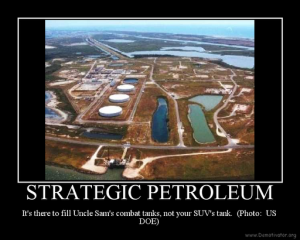 President Obama recently announced his desire to dust off plans for tapping the United States’ Strategic Petroleum Reserves. This is the latest in a series of actions by the Administration suggesting the U.S. is quietly preparing for a war with Iran in the near future. Further, this closely held knowledge is a tell-tale indicator that senior U.S. planners expect a war with Iran to disrupt oil supplies. As such, Americans should prepare to see gas prices easily double and rationing as early as this fall if Israel is not prevented from attacking. Prepare now.
President Obama recently announced his desire to dust off plans for tapping the United States’ Strategic Petroleum Reserves. This is the latest in a series of actions by the Administration suggesting the U.S. is quietly preparing for a war with Iran in the near future. Further, this closely held knowledge is a tell-tale indicator that senior U.S. planners expect a war with Iran to disrupt oil supplies. As such, Americans should prepare to see gas prices easily double and rationing as early as this fall if Israel is not prevented from attacking. Prepare now.
The Obama Administration suggested this move was to help bring the gas prices down and counter heavy speculation on the futures market. The problem is this explanation fails to neither make sense nor justify its use. Tapping the reserves will have only minimal impact on prices and the U.S. will ultimately need to replenish the used petroleum so the purchasing of petroleum by the U.S. will actually show no net change. Granted, the cost of gasoline in the U.S. is at oppressive levels, but has been for years now without any need to draw from strategic reserves. If this was effective, it could have been done years ago.
Others have suggested political motives stating Obama wanted to lower gas prices before the election and to help the economy, but for the already aforementioned reasons, this at best, would be limited and short-term. At current consumption rates for imported petroleum, U.S. reserves would barely last two months. However, even that is misleading because the maximum withdrawal capacity is only around 4.4 million barrels per day…roughly a fifth of what the U.S. uses per day in unrefined capacity. Production is currently above demand so additional reserves being added to the already abundant oil market will again do little. Further, U.S. refineries already operate at peak capacity so the “extra” oil would go nowhere. If this was actually a feasible plan for jump starting the economy, why didn’t Obama do this long ago?
Finally, some Administration insiders have leaked that this was in fact a way to drive down increased oil prices to hurt Iran. Since additional sanctions went into place on July 1st against Iran, oil prices have climbed due in part to approximately 1 million barrels per day of oil being taken off the market. However, Iran has still found markets, as we predicted and is actually enjoying increased revenue from the price spike. If the U.S. was serious about sanctioning Iran, they would not have given exemptions to nearly every country, such as China and Japan, that were already importing Iranian oil. Considering that the markets had over a year ago priced in this event, the Saudis have increased production, and the U.S. has a surplus of oil, as identified above, this explanation too fails to justify tapping the reserves.
In reality, the Obama Administration is “dusting off” plans to draw on the strategic reserves because they are expecting disruptions to oil supplies in the near future. The strategic reserves serve one purpose. This purpose is to provide essential petroleum to refineries to support critical U.S. infrastructure including power generation plants, key industry, heating, and transportation. Oh, and the military is who gets first dibs! This is only done to supplement imports during emergency situations such as war or natural disaster. The last two uses were to supplement production knocked offline by Hurricane Katrina and the temporary loss of Libyan production during the height of its civil war.
The major disruption that the U.S. is getting ready for without setting off alarms is an attack on Iran. The U.S. knows that even in the best of outcomes, a military strike on Iran will spike fuel costs and cause at least a temporary disruption in global oil supplies. At worst, production throughout the entire Gulf region could be destroyed and the world would face a chain of catastrophic events beginning with a massive price spike and shortages. Further, the U.S. (taxpayer) most likely is going to get stuck with resupplying Israel with oil as it has previously done when oil to Israel has been cut off due to its wars. Either way, it is a prudent move for any commander about to attack a country with one of the largest reserves of oil to be ready for supplies to be shut off. A war is the single reasonable answer to this so be forewarned.
http://www.dailytimes.com.pk/default.asp?page=2012%5C08%5C19%5Cstory_19-8-2012_pg5_25
By Guiles Hendrik